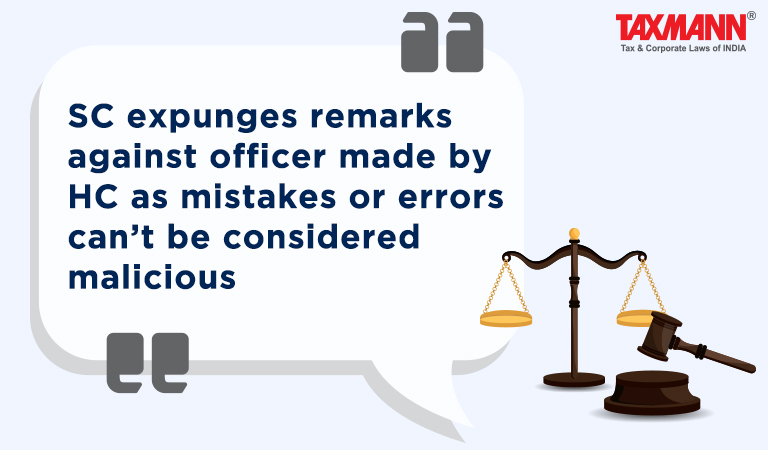SC expunges remarks against officer made by HC as mistakes or errors can’t be considered malicious
- Blog|News|GST & Customs|
- 2 Min Read
- By Taxmann
- |
- Last Updated on 26 April, 2022

Case Details: Chandra Prakash Mishra v. Flipkart India (P.) Ltd. - [2022] 137 taxmann.com 366 (SC)
Judiciary and Counsel Details
-
- Dinesh Maheshwari and Aniruddha Bose, JJ.
- Pallav Sisodia, Sr. Adv. Gautam Kumar Latta, Kiran Mahato, Advs. and Praveen Agrawal, AOR for the Petitioner.
- Tarun Gulati, R.K. Raizada, Sr. Advs. Kishore Kumar, Manish Rastogi, Advs. Rony Oommen John and Bhakti Vardhan Singh, AOR’s for the Respondent.
Facts of the Case
The officer of VAT department had passed ex parte assessment orders and enforcing recovery proceedings against the assessee. It filed writ petition as notice was not served on it. The assesse had shifted its place of business from Noida to Ghaziabad, which was very much in the knowledge of the department in view of the applications made and other communications addressed by it. The High Court essentially found that the ex parte order was passed against the assessee without proper service of notice.
The High Court, therefore, set aside the ex parte assessment order and quashed the recovery proceedings. The High Court also made the observations that departmental action be taken and finalised at the earliest and the department would also consider as to whether the officer was a person fit to be assigned such important quasi-judicial functions. The appellant officer filed civil appeal against the order of the High Court.
Supreme Court Held
The Apex Court observed that at time of drawing up assessment orders, appellant had no other registered address of assessee on record. Therefore, his action of passing ex parte assessment orders could not have been termed as being deliberate or wanting in good faith. The High Court seems to have taken sterner view of matter, which was not required in given set of facts and circumstances as mistakes or omissions can’t be considered as malicious. Therefore, the remarks and observations by the High Court against appellant were expunged.
Disclaimer: The content/information published on the website is only for general information of the user and shall not be construed as legal advice. While the Taxmann has exercised reasonable efforts to ensure the veracity of information/content published, Taxmann shall be under no liability in any manner whatsoever for incorrect information, if any.

Taxmann Publications has a dedicated in-house Research & Editorial Team. This team consists of a team of Chartered Accountants, Company Secretaries, and Lawyers. This team works under the guidance and supervision of editor-in-chief Mr Rakesh Bhargava.
The Research and Editorial Team is responsible for developing reliable and accurate content for the readers. The team follows the six-sigma approach to achieve the benchmark of zero error in its publications and research platforms. The team ensures that the following publication guidelines are thoroughly followed while developing the content:
- The statutory material is obtained only from the authorized and reliable sources
- All the latest developments in the judicial and legislative fields are covered
- Prepare the analytical write-ups on current, controversial, and important issues to help the readers to understand the concept and its implications
- Every content published by Taxmann is complete, accurate and lucid
- All evidence-based statements are supported with proper reference to Section, Circular No., Notification No. or citations
- The golden rules of grammar, style and consistency are thoroughly followed
- Font and size that’s easy to read and remain consistent across all imprint and digital publications are applied



 CA | CS | CMA
CA | CS | CMA
